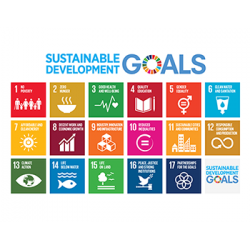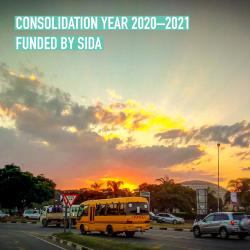By Marcela Guerrero Casas, African Centre for Cities
From choosing the right venue, to understanding the various dimensions and implications of power, the second AURI workshop about knowledge co-production led to a frank and intimate conversation about the intricacies of this form of research.
The second workshop, co-hosted by African Urban Research Initiative (AURI) and Mistra Urban Futures programme, focused on knowledge co-production, and led to frank conversations about the personal, professional, and power-laden dynamics related to research.
As Dr Rike Sitas, the co-facilitator of this session explained, knowledge co-production is a unique form of research where knowledge production moves beyond the academic register – it “brings together different stakeholders, such as government officials, civil society and researchers from different disciplines and sectors, to collaboratively undertake research on real world problems and jointly produce knowledge that is both useful for policy and practice and which makes a valuable contribution to academic knowledge.”
Rike started off by getting the group into a co-production mode asking everyone to ”drop their titles”. She explained that levelling the playing field is one of the first things one must do when engaging in this type of process. Creating a conducive and comfortable environment was one of the key themes that came up throughout the session with presenters and participants sharing practical tips.
Urban Food Security Specialist, Paul Opiyo from the Kisumu Local Interaction Platform (KLIP), highlighted the methods used in ensuring genuine participation based on his experience with the Consuming Urban Poverty (CUP) process in Kisumu, Kenya (for CUP Policy Briefs, links and contacts, scroll down to bottom of the page).
Paul spoke about the critical importance of identifying the right stakeholders and reflected on his own experience in Kisumu, where his team was guided by the question “Who will benefit from the knowledge produced and who will be affected (either negatively or positively) by the resulting recommendations?” His team made a commitment from the outset to ensure that all the input from participants would be incorporated and that those findings would be shared with everyone in a timely manner. In Kisumu, where communities often see researchers come and go without any follow up, this was particularly crucial.
Paul also shared some strategies to ensure people felt at ease in this process such as finding a neutral venue and choosing junior researchers to present the data in order to avoid evident hierarchies and the likely domination by senior academics or people in positions of authority.
The resulting output in the KLIP project, a series of three policy briefs, was not only co-owned by the participants, they eventually found their way into Kisumu’s local policy. In fact, Paul explained that for the first time, food was included in urban planning and that this research was quoted as the resource that underpinned that decision. In embracing the co-production approach, two of the policy briefs reflected direct suggestions drawn from the co-production conversations. A third brief, directed at non-governmental organisations, took a different approach. It presented the CUP research findings, but rather than make policy recommendations, it listed "policy issues" requiring possible action, informed by the research findings.
Next, Dr Gilbert Siame from the Centre for Urban Research and Planning (CURP) at the University of Zambia, shared insights about the dynamics between power and interests in a context where formal and informal actors are involved, such as Soweto Market, Lusaka’s largest market, where his research was conducted. Gilbert reminded the group that in this process “we are walking together, and even though leadership is important, the journey is walked by researchers, policy makers and communities as one.”
Early in his research, it became apparent that engaging with the different realities and meanings held by various actors in the market would be critical to unearthing and understanding the various flows of knowledge of that space. The Soweto Market process involved a wide range of actors, from traders to political parties and even international organisations. Gilbert’s team was methodical in documenting and understanding the various stakeholders (for example, they mapped the tensions between interest and power) as they knew that each played a crucial role in preventing any disruptions in the project.
By bringing everyone into the fold and asking them for guidance on how to collect the data, which questions to ask, and the role they wanted to play, Gilbert and his team achieved a level of ownership which then allowed them to discuss difficult findings openly and safely. By the end of the project, they were free to say critical things about the party cadres and food agents who were distorting the market. Because those groups were present in the room and had been part of the process, there was no sense of criticism, but rather of a finding they had discovered together.
After the presentations Dr Gareth Haysom led the group in several small group discussions. Gareth introduced the “domains of power” and their manifestations. He highlighted that “power is often unseen, but, ever-present” and that in co-production, awareness of the multiple and often intersecting power-related processes is essential. This linked back to GIlbert’s presentation and the activity where participants were asked to map the intersections between power and interest. Workshop participants then used a co-production manifesto template to discuss their own processes and to raise challenges and suggestions.
The group discussed a myriad of practical strategies to deal with sustaining interest of stakeholders, being genuine about the process by disclosing objectives and goals while including participants in the agenda-setting process, and ensuring sufficient time is available to undergo an effective process given the various constraints by all actors involved, to name just a few.
Time was indeed not long enough to tackle all the issues during this workshop, but the group did arrive at the conclusion that co-production is an important and valuable strategy, although it may not necessarily be suited for all situations. A careful analysis of the research topic, context, stakeholders and ultimate objective is essential in making a decision about the use of knowledge co-production. Co-production can be a powerful way to generate action-oriented knowledge, but it is crucial that it responds to the needs of all stakeholders involved and that it builds on the key principles emerging from the discussion, such as: patience; empathy; reflexivity; and action.
The last workshop in the series, which will focus on building pan-African comparative research projects, takes place on 25 March. The workshop will explore the methods which underpin comparative research, and will focus on building potential comparative and collaborative projects among the researchers involved in the AURI network. To kick off, we will have inputs from Omar Nagati from the Cairo Lab for Urban Studies, Training and Environmental Research (CLUSTER) and Dr Sylvia Croese from the University of Witwatersrand. Omar will share CLUSTER’s experience undertaking comparative research between different cities both within Egypt and across the African continent, and Sylvia will speak about the lessons and challenges of creating a comparative framework for localization of the Sustainable Development Goals (SDGs). These inputs will anchor a participatory process in which participants can discuss future potential projects and collaborations.
Text: Marcela Guerrero Casas
Photo: Soweto, South Africa by PhotoAfrica/Ilan Ossendryver CC-SA-BY 4.0

Consuming Urban Poverty Policy Briefs. Editors Dr Jane Battersby and Prof Vanessa Watson.
Contact: Paul Otieno Opiyo or Prof Stephen Gaya Agong'
Policy Brief # 2: The Importance of the Informal Food Sector in the Kisumu Food System
Policy Brief # 3: Enhancing Food Security through Urban Infrastructure and Services
Policy Brief # 4: Food Security in Kisumu: A Call for Greater Engagement in the Urban Food System








